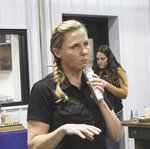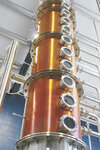

KNOWLTON, Wis. — When one thinks of Wisconsin and milk processing, there is a good chance cheese is the first thing that may come to mind. What might not come to mind, however, is vodka or gin.
The Mullins family of Mullins Cheese is hoping to change that with their Knowlton House Distillery in Knowlton. Last fall, the family opened the doors of the business, which distills whey into top-quality vodka and gin marketed under the brand name TenHead Spirits.
TenHead Spirits has been a work in progress for nearly a decade, said Heather Mullins, a fermentation specialist by trade who is married to fourth-generation cheesemaker, Luke Mullins.
Heather Mullins explained the concept behind Knowlton House Distillery and the process used to create vodka and gin Feb. 29 to members of the FarmFirst Dairy Cooperative.
In project infancy, Mullins said she spent nearly two years working in her garage to develop exactly the strain of yeast she was seeking.
“I married into the right family for a good, consistent source of sugar to work with,” Mullins said. “It takes a very special yeast strain to convert that lactose into alcohol. That is where my background in fermentation sciences comes into play. Standard brewer’s yeast will leave lactose behind. I want a yeast that will eat all the sugar, leaving behind only the alcohol. I wanted to develop a yeast that would do that work for us.”
The whey that Mullins uses to create distilled spirits is the byproduct of the cheese making that happens at the family’s nearby processing facility.
“To make 1 pound of cheese curd, you’re left with 9 pounds of whey as a byproduct,” Mullins said. “They are pulling the protein off the whey and drying to it sell as whey protein. What is left is lactose, some salt and minerals, and some of that is coming over to me as this lovely source of sugar.”
The whey Mullins receives from the cheese plant requires little additional processing before she can begin the process of distilling it into the final TenHead product. The whey is pasteurized and then mixed with the yeast Mullins created and placed into fermentation vats for a week.
Once the fermentation process is completed, a 7% distiller’s brew remains. That is transferred to the still where it undergoes distillation through a series of 18-20 copper plates. It becomes more concentrated until it reaches 95% alcohol, the government-required level for completion of the distillation process.
“The distillation process works because water and ethanol boil at different temperatures,” Mullins said.
While water boils at 212 degrees, ethanol boils at 173 degrees.
“The ethanol is evaporated, and it does not condense back to a liquid,” Mullins said. “The vapor continues to go over the still, leaving the water behind.”
The process continues through a series of copper plates that sort the bad components out, leaving a 40% vodka that is ready for consumption.
Mullins said gin is made by adding botanicals to vodka.
“All gin is required by the government to have juniper in it from juniper berries,” Mullins said. “That is what gives gin the strong pine-like taste. We can add other botanicals to make unique varieties, things like coriander, ginseng and birch bark, which tastes like sarsaparilla. We can give the gin a citrus note or a more floral note.”
Mullins’s efforts have paid off in a short time. TenHead vodka was awarded a gold medal at the recent American Craft Spirits Association annual tasting competition while the TenHead Woodland Dry gin was given silver medal recognition.
The history of the area and the heritage of the Mullins family are honored by the distillery’s profile.
Naming the distillery Knowlton House is a nod to the immigrants who settled the area, Mullins said.
“There was a roadhouse located here called the Knowlton House,” Mullins said. “This was the halfway point between the towns of Stevens Point and Wausau. It was a two-day trip between the towns. People would stop here, eat, spend the night and change horses.”
The name TenHead pays homage to the Mullins family’s entry into the dairy farming world of Wisconsin. In 1849, Patrick Mullins sold 10 head of cattle in Ireland and set sail to America to begin a new life as a dairy farmer. Seven generations later, the family has evolved from dairy farmers to cheesemakers and now distillers.
“This was all started from the sale of those 10 head of cattle,” Mullins said.
Because of those ties to the dairy industry, the Mullins family said creating additional uses for the whey left behind by the cheese-making process is a natural progression for their business. The milk sugars in the whey leave behind a mildly sweet flavor and a silky texture, making it nearly ideal for the creation of distilled spirits.
“From milk to vodka, the only thing we add is the yeast,” Mullins said. “It’s very much a dairy product.”
Comments
No comments on this item Please log in to comment by clicking here